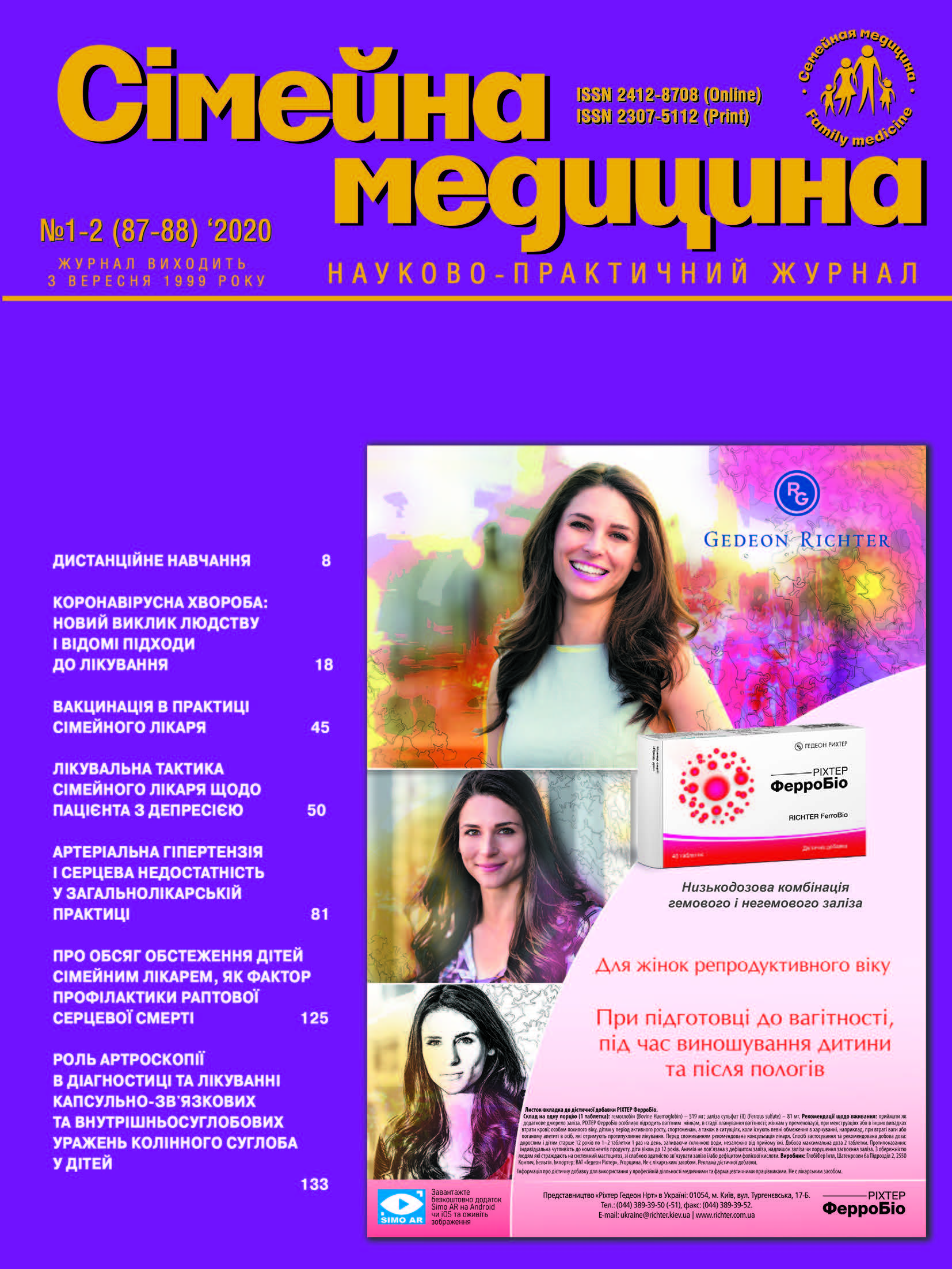Obesity, Hyperinsulinemia, IGF-1, and Hyperglycemia as Risk Factors for Colorectal Cancer in Patients with Type 2 Diabetes mellitus
##plugins.themes.bootstrap3.article.main##
Abstract
The latest studies prove an increased risk of colorectal cancer in patients with type 2 diabetes mellitus. The pathogenetic factors of type 2 diabetes have been recognized as mechanisms of association between these diseases.
The objective: to investigate the effects of obesity, hyperinsulinemia, IGF-1 and hyperglycemia on the development of colorectal cancer in patients with type 2 diabetes.
Materials and methods. 36 patients were divided into groups: I – healthy (control group), II – patients with type 2 diabetes mellitus, III – patients with colorectal cancer without diabetes, IV – patients with a combination of two diseases. Using the method of enzyme-linked immunosorbent assay were determined levels of insulin and insulin-like growth factor-1 (IGF-1). DM compensation was assessed by the level of glycosylated hemoglobin (HbA1c) that was determined by immuno-exchange chromatography. The data obtained were analyzed using Statistica 12.0 (StatSoft Inc.,USA). Differences between the values in the control and experimental groups were determined by the Student’s t-test. The differences were considered significant at р<0.05.
Results. According to the data obtained, colorectal cancer was diagnosed in patients with the age of over 60 years old with obesity. The body mass index (BMI) in patients of all study groups was higher than 30 kg/m2. Patients of group IV with a combination of type 2 diabetes and a circle of rectal cancer had significantly higher BMI compared to the control group (р<0.05). Significant hyperinsulinemia and increased IGF-1 levels were detected in patients in all study groups (р<0.05). Most patients with diabetes in both groups had HbA1c levels higher than 7.5%.
Conclusions. Obesity, hyperinsulinemia, increased bioavailability of IGF-1, and hyperglycemia are pathogenetic factors in the risk of colorectal cancer in patients with type 2 diabetes. Patients over the age of 55 with diabetes, obesity, and hyperinsulinemia are advised to be screened for colorectal cancer.##plugins.themes.bootstrap3.article.details##

This work is licensed under a Creative Commons Attribution 4.0 International License.
Authors retain the copyright and grant the journal the first publication of original scientific articles under the Creative Commons Attribution 4.0 International License, which allows others to distribute work with acknowledgment of authorship and first publication in this journal.
References
Alderete TL, Byrd-Williams CE, Toledo-Corral CM, Conti DV, Weigensberg MJ, Goran MI (2011). Relationships between IGF-1 and IGFBP-1 and adiposity in obese African-American and Latino adolescents. Obesity (Silver Spring). 19(5):933–938. doi:10.1038/oby.2010.211.
Bjørge T, Engeland A, Tverdal A, Smith GD. (2008). Body mass index in adolescence in relation to cause-specific mortality: a follow-up of 230,000 Norwegian adolescents. Am J Epidemiol. 168:30–37. doi:10.1093/aje/kwn096.
Campisi J. (2013). Aging, cellular senescence, and cancer. Annual review of physiology, 75:685–705. doi:10.1146/annurev-physiol-030212-183653.
Dobbins M, Decorby K, Choi BC. (2013). The Association between Obesity and Cancer Risk: A Meta-Analysis of Observational Studies from 1985 to 2011. ISRN Prev Med. 2013:680536. doi:10.5402/2013/680536.
Fedorenko ZP, Kolesnik OO, Mykhaylovych YuY, Ryzhov AYu, Sumkina OV. (2018). Epidemiolohichni peredumovy dotsilnosti vprovadzhennya skryninhu kolorektalnoho raku v Ukrayini. Klynycheskaya Onkolohyya. 8;4(32):258–263. [In Ukrainian].
García-Jiménez C, Gutiérrez-Salmerón M, Chocarro-Calvo A, García-Martinez JM, Castaño A, De la Vieja A. (2016). From obesity to diabetes and cancer: epidemiological links and role of therapies. British journal of cancer. 114;7:716–722. doi:10.1038/bjc.2016.37.
Hanahan D, Weinberg RA. (2011). Hallmarks of cancer: the next generation. Cell. 144(5):646–674. doi:10.1016/j.cell.2011.02.013.
Mattu HS, Randeva HS. (2013) Role of adipokines in cardiovascular disease. J Endocrinol. 216(1):17-36. doi:10.1530/JOE-12-0232.
Mykhaylovych YuY, Zhurbenko AV, Sumkina OV. (2013). Praktychni aspekty vprovadzhennya skryninhu kolorektalnoho raku v Ukrayini. Sotsialno-ekonomichne obgruntuvannya. Klynycheskaya onkolohyya. 3(1):6–10. [In Ukrainian].
Otake S, Takeda H, Suzuki Y, Fukui T, Watanabe Sh, Ishihama K, Saito T, Togashi H, Nakamura T, Matsuzawa Yu, Kawata S. (2005) Association of Visceral Fat Accumulation and Plasma Adiponectin with Colorectal Adenoma: Evidence for Participation of Insulin Resistance. Clin Cancer Res. 11(10): 3642-3646; doi: 10.1158/1078-0432.CCR-04-1868.
Paul JHL Peeters, Marloes T Bazelier, Hubert GM Leufkens, Frank de Vries, Marie L De Bruin (2015). The Risk of Colorectal Cancer in Patients With Type 2 Diabetes: Associations With Treatment Stage and Obesity. Diabetes Care. 38 (3): 495-502; doi: 10.2337/dc14-1175.
Pelucchi C, Negri E, Talamini R, Levi F, Giacosa A, Crispo A, Bidoli E, Montellae M, Franceschif S, La Vecchia C. (2010). Metabolic syndrome is associated with colorectal cancer in men. Eur J Cancer. 46 (10):1866-1872. doi:10.1016/j.ejca.2010.03.010.
Pushkarev VM, Sokolova LK, Pushkarev VV, Tron’ko MD. (2018). Biokhimicheskiye mekhanizmy, svyazyvayushchiye diabet i rak. Deystviye metformina. Endokrynolohiya. 23(2):167-179. [In Ukrainian].
Salukhov VV, Kadin DV. (2019). Obesity as an oncological risk factor. Literature review. Meditsinsky Sovet. 4:94-102. doi:10.21518/2079-701X-2019-4-94-102.
Xiao B, Sanders MJ, Underwood E, Heath R, Mayer FV, Carmena D, Jing C, Walker PA, Eccleston JF, Haire LF, Saiu P, Howell SA, Aasland R, Martin SR, Carling D, Gamblin SJ. (2011). Structure of mammalian AMPK and its regulation by ADP. Nature. 472(7342):230-3. doi: 10.1038/nature09932.
Yang YX., Hennessy S., Lewis JD (2005). Type 2 Diabetes Mellitus and the Risk of Colorectal Cancer. Clin Gastroenterol Hepatol. 3(6): 587–594. doi:10.1016/s1542-3565(05)00152-7.
Yuhara H, Steinmaus C, Cohen SE, Corley DA, Tei Y, Buffler PA (2011). Is diabetes mellitus an independent risk factor for colon cancer and rectal cancer? Am J Gastroenterol.106(11):1911-21. doi:10.1038/ajg.2011.301.





